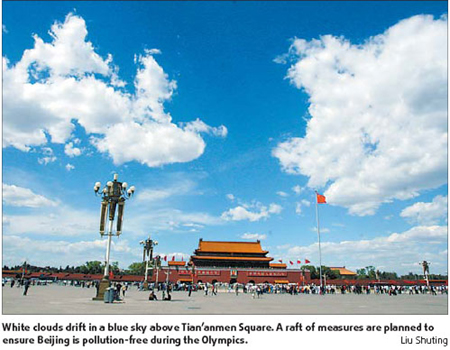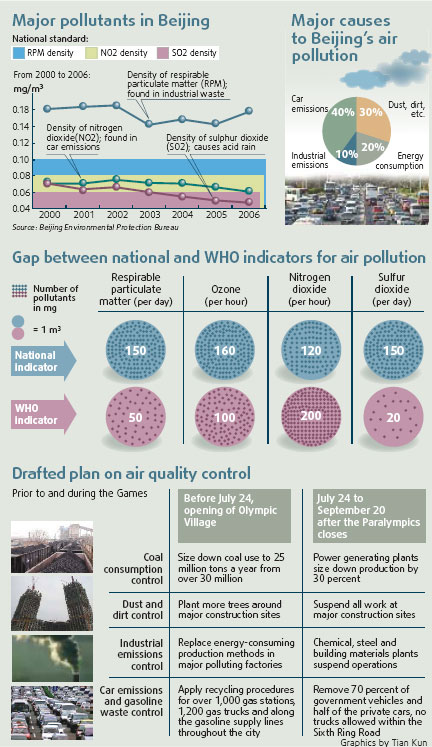It was meant to showcase the crystal clear air sports fans and athletes will enjoy during the Beijing Olympics.
But environment expert Yang Fuqiang fears the capital's air quality didn't improve enough during the Games test period.
"Pollutants caused by car waste dropped between 15 to 20 percent during the four-day car ban in August, but I am thinking about 50 to 60 percent decrease of pollutants for next year," said Yang, who has lived in the capital for 14 years.
Yang spent seven years in the 1970s and 80s in the capital as an energy researcher, and has lived here for another seven since 2000 as chief representative of the US-based Energy Foundation in Beijing.
"We wouldn't like the first Olympic experience most of us have to turn sour," he said. "We need stronger measures now, rather than regret afterward."
Beijing's fast-growing economy has partly come at the price of its ecology. Old-fashioned factories and thousands of new cars give citizens a hard time, leaving the skyline smoggy and regularly blowing sandstorms into town during the spring.
Measures to combat pollution began in 1998 when the capital realized the urgency of cleaning up the air, with the government alone spending 120 billion yuan ($16 billion) in the intervening years on environmental work.
During the week-long National Day holiday that ended on October 7, countless drivers headed out of the city for countryside breaks. Statistics from Beijing's environmental bureau show air quality during the holiday was three times better than usual.
But for Zhang Lian, a 46-year-old cab driver, the difference passed unnoticed.
"Seven days don't make a big difference," he said. "If we can remove cars for a month or two, that would be quite something."
A more stringent plan shielding the Olympic city from major pollution before and during the Games is under final revision at the national and local environmental authorities, Beijing-based Caijing magazine reported in its latest issue. If the second draft gets the green light from the State Council, it will become the most serious move by China to guarantee air quality so far.
According to a draft released, Beijing will bring down coal use to 25 million tons a year from over 30 million, update energy-consuming production techniques at major polluting factories, and apply recycling procedures at over 1,000 gas stations throughout the city before officially opening the Olympic Village by the end of July 2008.
From July 24 to September 20, the city, which will have over 3.3 million vehicles on the road by then, plans to remove 70 percent of government vehicles and half the private cars. Chemical, steel and building materials plants will also suspend operations, while power generating plants will be forced to reduce coal burning during the 58-day Games period.
There is also an unprecedented plan for regional governments in neighboring industrial clusters such as Hebei and Shanxi provinces to join in measures ahead of and during the Games.
"I think the rules can be understood and carried out," said Yang. "After all, the purpose is for athletes to feel pleasant and comfortable to compete.
"We don't want athletes to be angry about Beijing's air and lower their expectations."
Beijing Yanshan Petrochemical Company, which provides about half of the city's 5 million tons of gasoline each year, will become the first and only provider of gasoline under the EURO IV standard from next New Year's Day pending a government order.
If implemented, the move will cut 1,400 tons from the 180,000 tons of sulfur dioxide emissions which escape into the sky above Beijing every year.
The company is also proposing to the municipal government to install nitrogen dioxide control at their key production areas, said Ma Chenghua, a senior manager.
"Certainly we support the government plans because the Olympics is an exceptional event. However, although Beijing can stop steel production, it can't do without a minimum of gasoline needed to keep the city operating safely," he told China Daily.
It has been reported that power plants around the city are concerned about the impact of a 58-day suspension. But in the long term, another problem looms for the environment watchdog: catching up with what many other cities consider the starting line.
"In our current air quality index, nitrogen dioxide density is not considered a major factor and ozone air pollution is totally excluded," said Yang. "In western cities, where these things are measured, even unpleasant days are better than some of the best weather we have here."
The environment expert said Beijing may need a little help from the weather to keep the air flowing during the Games.
We are completely confident that Olympic athletes will be able to take part in their competitions normally next August," Liu Qi, Beijing Party chief and head of the Beijing Olympics Organizing Committee told the Financial Times last month, citing the focus on implementing environmental rules instead of short-term measures.
"The main thing is to strengthen factories' management of gases and reduce emissions," Liu said.
Yang said he agreed with Liu's plan to develop more energy-saving technology and public transport.
"In the end, Beijing has a leading role to play and this is an opportunity to show the country that the government cares about the health of the general public as much as the health of international athletes coming for the Games," he added.
(China Daily October 11, 2007)







